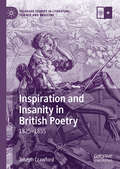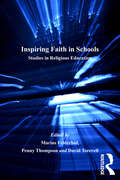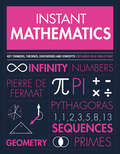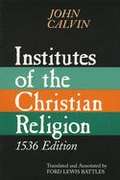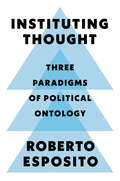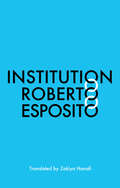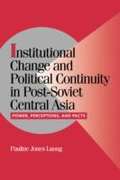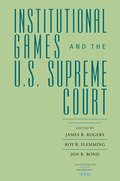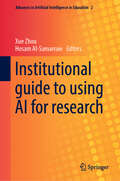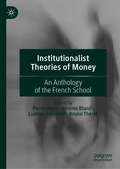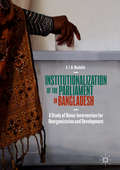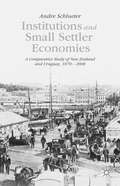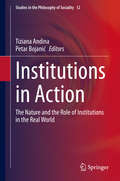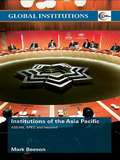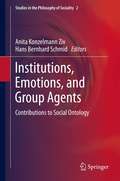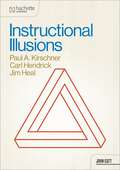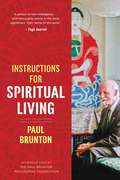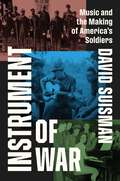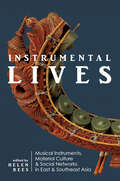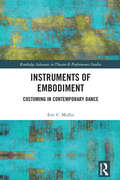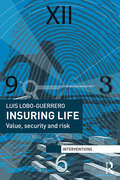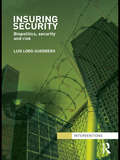- Table View
- List View
Inspiration and Insanity in British Poetry: 1825–1855 (Palgrave Studies in Literature, Science and Medicine)
by Joseph CrawfordThis book explores the ways in which poetic inspiration came to be associated with madness in early nineteenth-century Britain. By examining the works of poets such as Barrett, Browning, Clare, Tennyson, Townshend, and the Spasmodics in relation to the burgeoning asylum system and shifting medical discourses of the period, it investigates the ways in which Britain’s post-Romantic poets understood their own poetic vocations within a cultural context that insistently linked poetic talent with illness and insanity. Joseph Crawford examines the popularity of mesmerism among the writers of the era, as an alternative system of medicine that provided a more sympathetic account of the nature of poetic genius, and investigates the persistent tension, found throughout the literary and medical writings of the period, between the Romantic ideal of the poet as a transcendent visionary genius and the ‘medico-psychological’ conception of poets as mere case studies in abnormal neurological development.
Inspiring Faith in Schools: Studies in Religious Education (Explorations in Practical, Pastoral and Empirical Theology)
by Marius FelderhofInspiring Faith in Schools addresses the privileging of secularism that appears to affect RE in countries influenced by modern western thought. The authors argue that a more engaging form of RE would emerge if religious life were to inhabit centre stage. Currently religious faith is made to hover in the wings awaiting the call to face the inquisitorial challenge of the modern day enquirer. The consequent relationship between pupil and the Divine as the purpose of study is then already intrinsically irreligious, as indicated in the Book of Job by putting God in the dock, whereas it is the pupil who should be (cross-)examining his or her life. What are the ways of exciting and engaging the young so that they begin to entertain the possibility of religious life as a genuine option for themselves? Leading scholars in philosophy and theology from the UK, Australia, Canada and the USA come together to address these questions together with RE experts. Marius Felderhof writes an Afterword summing up the challenges faced by such a re-visioning of RE.
Instant Mathematics: Key Thinkers, Theories, Discoveries And Concepts Explained On A Single Page (Instant Knowledge)
by Paul Parsons Gail DixonKey thinkers, theories, discoveries, and concepts each explained on a single page! Instant Mathematics pulls together all the pivotal mathematical theories and discoveries into one concise volume. Each page contains a distinct “cheat sheet,” which tells you the most important facts in bite-size chunks, so you can feel like an expert in minutes! From zero to Riemann Hypothesis, from primes to irrational numbers, and from Pythagoras to John Nash and Roger Penrose—every key figure, theory, or term is expressed in succinct and lively text and graphics. Perfect for the knowledge-hungry and time-poor, this collection of graphics-led lessons makes math interesting and accessible. Everything you need to know—and more!—packed into one convenient volume.
Institutes of the Christian Religion: 1536 Edition
by John CalvinJohn Calvin was just twenty-seven years old when the first edition of his Institutes was published in Basel in 1536. Building on the work of Erasmus and Luther, Calvin wrote with brilliance and passion of the many ways the church and its theology had been "deformed," and he presented a case for restoring the church and theology to its pristine purity. Calvin's "little book" -- as he affectionately called it -- grew in size through the rest of his life; eventually, this early, shorter version evolved into what is now known as the Institutes, the 1559 edition, which Calvin considered the authoritative form of his thought for posterity. Noted Calvin scholar Ford Lewis Battles translated the 1536 Institutes in 1975, after completing his masterful translation of the 1559 Institutes. This revised edition of Battles' translation is now being published in recognition of the four- hundred-fiftieth anniversary of the original publication of the 1536 Institutes. <P><P> Intended both for readers who wish to gain a better understanding of this earliest expression of Calvin's theology and for scholars who may wish to pursue further research, this edition contains extensive notes and references. The book's four appendices include a new translation of Calvin's Preface to Olivétan's Bible (1535); the five indices include an index of biblical references and a comparative table of the 1536 and 1559 Institutes. The numerous citations in the endnotes from the writings of Calvin's predecessors and contemporaries illuminate the significance of the text in its historical context.
Instituting Thought: Three Paradigms of Political Ontology
by Roberto EspositoThis new book by the Italian philosopher Roberto Esposito addresses the profound crisis of contemporary politics and examines some of the philosophical approaches that have been used to try to understand and go beyond this crisis. Two approaches have been particularly influential – one indebted to the thought of Martin Heidegger, the other indebted to Gilles Deleuze. While opposed in their political thrust and orientation, both approaches remain trapped within the political ontology that has framed our conceptual language for some time. In order to move beyond this political ontology, Esposito turns to a third approach that he characterizes as ‘instituting thought’. Indebted to the work of the French political philosopher Claude Lefort, this third approach recognizes that the road to reconstructing a productive relation between ontology and politics, one that is both realistic and innovative, lies in instituting praxis. Building on this insight, Esposito conceptualizes social being as neither univocal nor plurivocal but as cross-cut by the dual semantics of political conflict. This new book by one of the most original European philosophers writing today will be of great interest to students and scholars in philosophy, social and political theory and the humanities generally.
Institution
by Roberto EspositoThe pandemic has brought into sharp relief the fundamental relationship between institution and human life: at the very moment when the virus was threatening to destroy life, human beings called upon institutions – on governments, on health systems, on new norms of behavior – to combat the virus and preserve life. Drawing on this and other examples, Roberto Esposito argues that institutions and human life are not opposed to one another but rather two sides of a single figure that, together, delineate the vital character of institutions and the instituting power of life. What else is life, after all, if not a continuous institution, a capacity for self-regeneration along new and unexplored paths? No human life is reducible to pure survival, to “bare life.” There is always a point at which life reaches out beyond primary needs, entering into the realm of desires and choices, passions and projects, and at that point human life becomes instituted: it becomes part of the web of relations that constitute social, political, and cultural life.
Institutional Change and Political Continuity in Post-Soviet Central Asia: Power, Perceptions, and Pacts
by Pauline Jones LuongAlthough the three former Soviet Republics of Kazakhstan, Kyrgyzstan, and Uzbekistan shared similar economic and political histories, they developed surprisingly different electoral regimes in the wake of the fall of the Soviet Union. Luong (political science, Yale U. ) seeks to unravel the puzzle of the causes of these institutional developments. She argues that the negotiations over electoral systems lay bare asymmetries of power that can then inform not only the nature of current political change, but also future prospects. She places elite perceptions of shifts in power at the center of her analysis, concluding that none of the political elites saw a fundamental challenge to their power and therefore continued to rely on regionalism as a foundation for their politics. Annotation c. Book News, Inc. , Portland, OR (booknews. com)
Institutional Games and the U.S. Supreme Court (Constitutionalism and Democracy)
by James R. Rogers Roy B. Flemming Jon R. BondOver the course of the past decade, the behavioral analysis of decisions by the Supreme Court has turned to game theory to gain new insights into this important institution in American politics. Game theory highlights the role of strategic interactions between the Court and other institutions in the decisions the Court makes as well as in the relations among the justices as they make their decisions. Rather than assume that the justices' votes reveal their sincere preferences, students of law and politics have come to examine how the strategic concerns of the justices lead to "sophisticated" behavior as they seek to maximize achievement of their goals when faced with constraints on their ability to do so. In Institutional Games and the U.S. Supreme Court, James Rogers, Roy Flemming, and Jon Bond gather various essays that use game theory to explain the Supreme Court's interactions with Congress, the states, and the lower courts. Offering new ways of understanding the complexity and consequences of these interactions, the volume joins a growing body of work that considers these influential interactions among various branches of the U.S. government.Contributors:Kenneth A. Shepsle, Andrew De Martin, James R. Rogers, Christopher Zorn, Georg Vanberg, Cliff Carrubba, Thomas Hammond, Christopher Bonneau, Reginald Sheehan, Charles Cameron, Lewis A. Kornhauser, Ethan Bueno de Mesquita, Matthew Stephenson, Stefanie A. Lindquist, Susan D. Haire, Lawrence Baum
Institutional guide to using AI for research (Advances in Artificial Intelligence in Education #2)
by Xue Zhou Hosam Al-SamarraieThis book provides a comprehensive exploration of the integration of artificial intelligence (AI) into academic research, specifically tailored for higher education institutions and postgraduate research (PGR) students. It addresses the unique challenges and opportunities that these institutions and students encounter when incorporating AI into research. The work emphasises practical case studies, step-by-step guides on AI tools and techniques, ethical considerations in AI usage, and features contributions from experts across various disciplines. Following the introduction, the book delves into the specifics of how AI can enhance academic research such as literature review, data analysis and interpretation, and assistance in academic writing across different disciplines. The wide range of topics introduced in this book is supported by practical examples and guidance. This book also explores the landscape of current AI applications in research, the methodologies for effectively leveraging AI technologies, and the critical ethical dimensions of AI work. The importance of interdisciplinary collaboration in expanding the use of AI in research is covered in this book by drawing on expert insights to provide a rich, multifaceted understanding of the potential of AI in academia. The combination of topics in this book can empower PGR students to navigate the complexities of AI in their research. The book is a much-needed compilation prepared by leading scholars in the field of digital technology to help PGRs, as well as decision-makers, determine the best ways to integrate and use AI tools in research.
Institutionalist Theories of Money: An Anthology of the French School
by Pierre Alary Jérôme Blanc Ludovic Desmedt Bruno ThéretThis book gathers several important texts and offers a general overview of the institutionalist approach to money developed in France since the 1980s.These texts highlight the specificities of the French monetary approaches and display their main contributions to the understanding of monetary phenomena - not just in our developed market economies, but also in other societies. By bringing these works to an English-speaking audience for the first time, this book provides a much needed and valuable direct insight to these rich texts, and contributes to related approaches such as post-Keynesian economics and neo-chartalist approaches to money. This book highlights the need for a global vision of money and a clearer link between money and political spheres. It will appeal to students and researchers across various disciplines including but not limited to economics, anthropology, sociology, history and philosophy.
Institutionalization of the Parliament in Bangladesh: A Study of Donor Intervention for Reorganization and Development
by A. T. ObaidullahThis book explores the institutionalization process with regard to the Parliament in Bangladesh, and seeks to identify the main constrains that hinder the Parliament from serving as the uppermost representative body for all segments of society.This book sheds valuable new light on key reform initiatives carried out by donor communities in collaboration with the Bangladesh Parliament between the years 1991 and 2015 by presenting an extensive selection of donor proposals to make the Parliament a more potent political institution. The book also focused on the barriers of strengthening oversight, fiscal oversight in particular, resourcing parliament and its secretariat, hindering gender equality and gender responsiveness, counteracting forces that are weakening rule of law, civil liberty of the citizens, constitutionalism and democratic consolidation in the country. The book presents a comparative picture of the pre- and post-reform Bangladesh Parliament, highlighting on the issue of how much the donor assistance can help promote institutionalization of the parliament and democratic consolidation of a developing country. The book will be of immense value to all scholars interested in democratic governance, administrative reforms, policy studies and the role of parliament as a watchdog ensuring accountability, transparency and national integrity.
Institutions and Small Settler Economies
by Andre SchlueterInstitutions and Small Settler Economies provides a comprehensive improvement in our understanding of institutional contributions to economic growth.
Institutions in Action: The Nature and the Role of Institutions in the Real World (Studies in the Philosophy of Sociality #12)
by Tiziana Andina Petar BojanićThis edited volume presents the social ontology of institutions. It questions what institutions are, what features and properties institutions have and what kinds of institution are present in the social world. The book answers these questions from both a speculative and an applied approach, it argues for a specific definition of institutions as a rule-based equilibria, as collective epistemic agent that is characterized by meaning, principles and power and as product of a We-mode and an imposition of a function. This book started from the interdisciplinary conference Playing by the Rules in Rijeka and contains contributions from Philosophy, Sociology and Economy.Institutions in Action is the first book to offer a comprehensive overview of the many different aspects and accounts about the social ontology of institutions. This much needed book presents researchers a very wide state of the art about the topic of institution by presenting the many differences that emerge in comparing the different positions.
Institutions of the Asia-Pacific: ASEAN, APEC and beyond (Global Institutions)
by Mark BeesonThe Asia-Pacific is arguably the most important, but also the most complex and contested, region on the planet. Containing three of the world’s largest economies and some of its most important strategic relationships, the region’s capacity of regional elites to promote continuing economic development whilst simultaneously maintaining peace and stability will be one of the defining challenges of the twenty-first century international order. Intuitively, we might expect regional institutions to play a major role in achieving this. Yet one of the most widely noted characteristics of the Asia-Pacific region has been its relatively modest levels of institutional development thus far. However, things are changing: as individual economies in the Asia-Pacific become more deeply integrated, there is a growing interest in developing and adding to the institutions that already exist. Institutions of the Asia-Pacific examines how this region is developing, and what role established organisations like APEC and new bodies like ASEAN Plus Three are playing in this process. An expert in the field, Mark Beeson introduces the contested nature of the very region itself – should it be the ‘Asia-Pacific’ or ‘East Asia’ to which we pay most attention and expect to see most institutional development. By placing these developments in historical context, he reveals why the very definition of the region remains unsettled and why the political, economic and strategic relations of this remarkably diverse region remain fraught and difficult to manage.
Institutions, Emotions, and Group Agents
by Hans Bernhard Schmid Anita Konzelmann ZivThe contributions gathered in this volume present the state of the art in key areas of current social ontology. They focus on the role of collective intentional states in creating social facts, and on the nature of intentional properties of groups that allow characterizing them as responsible agents, or perhaps even as persons. Many of the essays are inspired by contemporary action theory, emotion theory, and theories of collective intentionality. Another group of essays revisits early phenomenological approaches to social ontology and accounts of sociality that draw on the Hegelian idea of recognition. This volume is organized into three parts. First, the volume discusses themes highlighted in John Searle's work and addresses questions concerning the relation between intentions and the deontic powers of institutions, the role of disagreement, and the nature of collective intentionality. Next, the book focuses on joint and collective emotions and mutual recognition, and then goes on to explore the scope and limits of group agency, or group personhood, especially the capacity for responsible agency. The variety of philosophical traditions mirrored in this collection provides readers with a rich and multifaceted survey of present research in social ontology. It will help readers deepen their understanding of three interrelated and core topics in social ontology: the constitution and structure of institutions, the role of shared evaluative attitudes, and the nature and role of group agents.
Instructional Illusions
by Carl Hendrick Paul A. Kirschner Jim HealSo much of what happens in the process of learning and instruction is obscured from view. Much like the effects of a convincing illusion, what we think we see when we observe instruction is often far from the reality. Join three leading experts in the science of learning as they explore ten instructional illusions through the lens of educational psychology, cognitive science, and instructional design. Together, they will consider how such illusions operate, unmask their true nature in light of the evidence, and present powerful alternatives for authentic teaching and learning. Look beyond the illusion and reveal the true nature of instruction.
Instructional Illusions
by Carl Hendrick Paul A. Kirschner Jim HealSo much of what happens in the process of learning and instruction is obscured from view. Much like the effects of a convincing illusion, what we think we see when we observe instruction is often far from the reality. Join three leading experts in the science of learning as they explore ten instructional illusions through the lens of educational psychology, cognitive science, and instructional design. Together, they will consider how such illusions operate, unmask their true nature in light of the evidence, and present powerful alternatives for authentic teaching and learning. Look beyond the illusion and reveal the true nature of instruction.
Instructions for Spiritual Living
by Paul BruntonAnswers to the questions that arise on the spiritual path • Includes specially selected writings from the huge literary archive of Paul Brunton • Explains the different stages of meditation and the obstacles likely to arise for each, offering guidance for achieving advanced states of meditation to deepen one’s inner life • Challenges the need for spiritual dependency on any particular guru, teaching, or practice, showing that following your intuition can bring the best spiritual success • Explores the process of self-examination and emotional purification, revealing how to break free from the ego and tap into the inspiration flowing from within No matter where we are in our spiritual development, we all have questions about our practice and what we are experiencing--both the challenges and opportunities. How can I overcome my struggles to meditate more deeply? Is there a need for a guru or can I rely on myself? Can I trust my intuition? Is it possible to hear the “Inner Word,” the voice of the soul, and how can I be sure that’s what I’m hearing? Is the Higher Self in the heart? Offering trustworthy answers to these and many more questions, renowned spiritual teacher Paul Brunton provides instructions to guide one’s development in three fundamental areas of the spiritual path: meditation, self-examination, and the unfolding of awakening. Guiding you with insight and care through each stage of meditation, including advanced states that deepen one’s inner life, he explains how meditation is the art and practice of introverting attention, of freeing oneself for a period of time from thoughts, sensations, and feelings and allowing the soul to reveal itself out of the quiet that one has created. He explains the goal of each meditative stage and the obstacles you are likely to face and examines the need for spiritual dependency on any particular guru, teaching, or practice, showing that following your intuition can bring spiritual success. Exploring the process of self-examination and emotional purification, Brunton shows how life’s challenges are moments by which we can make real progress in our surrender to a higher life. He reveals how to break free from the ego, follow your intuition to align with your ideals, and tap into the inspiration flowing from within. He also examines the development of transcendental insight, the cornerstone of compassionate wisdom in action, which allows us to become a source of inspiration to all we encounter. Including writings received by the Paul Brunton Philosophic Foundation after his death, this guide offers transformative wisdom to aid our understanding of what the spiritual journey entails, help point the way when the way is uncertain, and learn and grow from the challenges that arise as you develop spiritually.
Instrument of War: Music and the Making of America's Soldiers
by David SuismanAn original history of music in the lives of American soldiers. Since the Civil War, music has coursed through the United States military. Soldiers have sung while marching, listened to phonographs and armed forces radio, and packed the seats at large-scale USO shows. “Reveille” has roused soldiers in the morning and “Taps” has marked the end of a long day. Whether the sounds came from brass instruments, weary and homesick singers, or a pair of heavily used earbuds, where there was war, there was music, too. Instrument of War is a first-of-its-kind study of music in the lives of American soldiers. Although musical activity has been part of war since time immemorial, the significance of the US military as a musical institution has generally gone unnoticed. Historian David Suisman traces how the US military used—and continues to use—music to train soldiers and regulate military life, and how soldiers themselves have turned to music to cope with war’s emotional and psychological realities. Opening our ears to these practices, Suisman reveals how music has enabled more than a century and a half of American war-making. Instrument of War unsettles assumptions about music as a force of uplift and beauty, demonstrating how it has also been entangled in large-scale state violence. Whether it involves chanting “Sound off!” in basic training, switching on a phonograph or radio, or cueing up an iPod playlist while out on patrol, the sound of music has long resonated in soldiers’ wartime experiences. Now we all can finally hear it.
Instrumental Lives: Musical Instruments, Material Culture, and Social Networks in East and Southeast Asia
by Helen Rees Jennifer C. Post Bell Yung Terauchi Naoko Tyler Yamin Maire-Pierre Lissoir Insee AdlerThe musical instruments of East and Southeast Asia enjoy increasing recognition as parts of humanity’s intangible cultural heritage. Helen Rees edits a collection that offers vibrant new ways to link these objects to their materials of manufacture, the surrounding environment, the social networks they form and help sustain, and the wider ethnic or national imagination. Rees organizes the essays to reflect three angles of inquiry. The first section explores the characteristics and social roles of various categories of instruments, including the koto and an extinct Balinese wooden clapper. In section two, essayists focus on the life stories of individual instruments ranging from an heirloom Chinese qin to end-blown flutes in rural western Mongolia. Essays in the third section examine the ethics and other issues that surround instrument collections, but also show how collecting is a dynamic process that transforms an instrument’s habitat and social roles. Original and expert, Instrumental Lives brings a new understanding of how musical instruments interact with their environments and societies. Contributors: Supeena Insee Adler, Marie-Pierre Lissoir, Terauchi Naoko, Jennifer C. Post, Helen Rees, Xiao Mei, Tyler Yamin, and Bell Yung
Instrumentality: On Technical Objects and Orientations in the Later Middle Ages
by J. Allan MitchellFrom medieval to modern, exploring instrumental attitudes toward physical gadgets, diagrams, concepts, methods, and disciplines Opening up the instrumental condition of the human for critical reflection and renewal, Instrumentality illuminates key moments in the intellectual history of the European Middle Ages. J. Allan Mitchell reveals how, in the predigital past, we can recognize many of the operative technics, analytics, and metaphorics that continue to shape human sense and cognition today. Exploring the diverse modalities of medieval instruments, Mitchell&’s case studies encompass techniques as seemingly distinct as time-keeping mechanisms, mathematical diagrams, logical syllogisms, and the literary devices of Geoffrey Chaucer and John Gower. A cultural and intellectual history, Mitchell&’s work leads readers from three-dimensional objects (physical mechanisms) to two-dimensional inscriptions (maps and diagrams) and onward to overarching disciplinary norms in the early liberal and mechanical arts. Prying loose the subtle, adaptable, and generative concept of technical objects from limiting contemporary frameworks, he shows how these instruments are indispensable to the past—and the future—of the arts and culture at large.
Instruments of Embodiment: Costuming in Contemporary Dance (Routledge Advances in Theatre & Performance Studies)
by Eric MullisInstruments of Embodiment draws on fashion theory and the philosophy of embodiment to investigate costuming in contemporary dance. It weaves together philosophical theory and artistic practice by closely analyzing acclaimed works by contemporary choreographers, considering interviews with costume designers, and engaging in practice-as-research. Topics discussed include the historical evolution of contemporary dance costuming, Merce Cunningham’s innovative collaborations with Robert Rauschenberg, and costumes used in Ohad Naharin’s Virus (2001) and in a ground-breaking Butoh solo by Tatsumi Hijikata. The relationship between dance costuming and high fashion, wearable computing, and the role costume plays in dance reconstruction are also discussed and, along the way, an anarchist materialism is articulated which takes an egalitarian view of artistic collaboration and holds that experimental costume designs facilitate new forms of embodied experience and ways of seeing the body. This study will be of great interest to students and scholars working in performance philosophy, philosophy of embodiment, dance and performance studies, and fashion theory.
Insurgent Collective Action and Civil War in El Salvador
by Elisabeth Jean WoodWidespread support among rural people for the leftist insurgency during the civil war in El Salvador challenges conventional interpretations of collective action. Those who supplied tortillas, information, and other aid to guerillas took mortal risks and yet stood to gain no more than those who did not. Wood's rich tapestry of explanation is based on oral histories gathered from peasants who supported the insurgency and those who did not over a period of many years during and immediately following the war, and interviews with military commanders of both sides. Peasants supported the FMLN, Wood found, not for any material gain that was contingent on their participation, but rather for moral and emotional reasons. Wood's alternative model places emotions and morals, as well as conventional interests, at the heart of collective action.
Insuring Life: Value, Security and Risk (Interventions)
by Luis Lobo-GuerreroThis book is a contribution to the scholarly engagement with the wider problem of governing through risk and the politics of uncertainty. It takes life insurance as an empirical site from which to ask: what is the kind of governance created through insurance an instance of, and how does it contribute to the transcendence of liberalism? By making a distinction between capable life as object of insurance, and potential life as that which escapes its control, the book conducts a historical epistemological analysis of the problems of valuation, truth production, securitisation, classification, and gendering that constitute life insurance products and practices. Insuring Life offers a critical engagement with the epistemology of life insurance to demonstrate the unnecessary and precarious character of the conditions that make this instrument of liberal governance possible. It concludes that the transcendence of liberalism relies on the technological agency of these instruments and that its challenge begins by redefining the terms under which the potential of life, if invaluable, is to be thought as event. The book follows Insuring War as the third of a trilogy that analyses how concepts and practices of power, risk and security materialise in the form of insurance as a central instrument of governance in the liberal world. It will be of great use to scholars, researchers, and postgraduate students of political economy, critical security studies and political theory, the biopolitics of security and post-structural politics. Insuring War: https://www.routledge.com/products/search?keywords=insuring+war Insuring Security: https://www.routledge.com/Insuring-Security-Biopolitics-security-and-risk/Lobo-Guerrero/p/book/9780415522854
Insuring Security: Biopolitics, security and risk (Interventions)
by Luis Lobo-GuerreroInsurance is the world’s largest economic industry, providing a form of security that more than triples global defence expenditure. However, little is know about the form of security insurance provides. This book offers a genealogical interrogation of the relationship between security and risk through its materialisation in insurance. This work seeks to argue that insurance practices ascribe value to life and in so doing produce a form of security central to the understanding of contemporary liberal governance and security. Lobo-Guerrero theorizes insurance as a biopolitical effect that results from the continuous interaction of an ‘entrepreneurial form of power’, and traditional forms of sovereign security. Through rich empirical cases and a unique theorization, the book breaks apart the traditional division between security studies, political economy and political theory. The author explores this theory in relation to specific issues such as the use of life insurance in the molecular age, the use of insurance to securitize against environmental catastrophic risk, specialist products such as kidnap and ransom insurance, as well as the use of insurance to counter maritime piracy in the twenty-first century. Providing an important and original contribution to the study of the biopolitics of security, this work will be of great interest to all scholars of security studies, international relations and international political economy. Insuring War: https://www.routledge.com/products/search?keywords=insuring+war Insuring Life: https://www.routledge.com/Insuring-Life-Value-Security-and-Risk/Lobo-Guerrero/p/book/9780415716079
